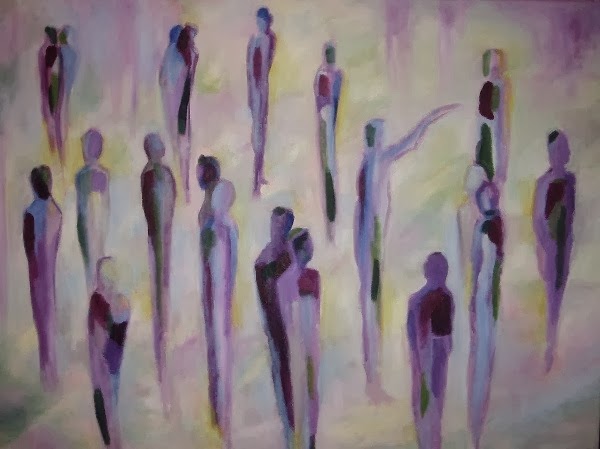 |
| Root Chakra |
Peter liked meditating early in the morning when other people in his family were still asleep or just beginning to stir. In addition to feeling the security of having his family nearby, unbiased in their sleep by the beliefs that they had established about him, his dreams were still fresh, and he was not in danger of falling asleep. Often he would lie still for over an hour before he got out of bed.
As he meditated, he intuited that the minds of many people were focused on the black cross. Some, of course, were giving up their sin and regret and suffering, but Peter also sensed others who were supporting the cross with their emotional, mental, and spiritual energy. Jesus was not the only one taking in negative feelings and thoughts in order to cleanse humanity. Many other people and spiritual entities were helping. Suddenly Peter had the feeling that he could help too. He wasn’t sure how, but he began to focus his energy in such as way as to take some of the blackness into himself, as if he were part of a large effort to cleanse the excess dark energy from the world.
Just as he was filling himself with light to cleanse the blackness from his soul, he heard some commotion in the courtyard. He peeked out the bedroom window and saw the police dragging away the artist who lived in a second story apartment across the way. They were pushing him and nudging him with rifle butts. Once Peter had shown the artist some of his own work, and the artist had been full of praise and encouragement. Then the artist had shown Peter a work in progress: on a huge canvas one person in thirty different poses in three rows on a bright red background. Though the poses were not contorted, when Peter stepped away from the painting, the figures appeared to be writhing in torment, possibly due to the red background.
The police also brought out the artist’s nine-year-old son, who watched his father get into the police car. The artist just sat in the police car looking straight ahead.
"Hey, what are you doing?" Peter yelled through the window. People from all over the complex were gathering in the complex, but nobody responded, so Peter ran outside in his pajamas. He found Cashing in the crowd.
"Apparently they believe your artist friend robbed a 7-11 last night. Looks like people around here are really starting to get desperate," Cashing said.
"What will they do with his son?" Peter asked.
"They’ll probably take him to his mother, if they can find her. I’ve heard that she’s a drug addict who just got out of jail. If they can’t find her, the boy will probably just go into foster care."
They watched silently as the police escorted the boy to another police car.
"Can we do anything?" Peter asked as the police drove away.
"I don’t think our meditations can help him much," Cashing mumbled, putting his hand on Peter’s shoulder. "I wish there was something we could do. I just finished an article on Archangels, which probably won't do any good anyway. Maybe you'd like to read it?"
"I want to deal with this. Can’t we bail him out, or something?" Peter said loudly.
"No one here has that kind of money."
"What if everyone here gave a little money to bail him out?" Peter was no longer just talking to Cashing, but to what was left of the crowd.
People just started walking away, shaking their heads and mumbling.
Peter followed Cashing into his apartment. "You don’t believe that we’re doing any good?" Peter asked.
"A famous man once said that the more you know, the more you want to crawl into a black hole and die, or something like that. I like your ideas. Really I do. I think they’re very beautiful. Maybe some ideas are just too beautiful for this world."
Peter stared at the floor.
"Look, I found out something else, and you’re not going to like it," Cashing said. "Our friend the landlord owns the place where we meditated the other day. He bought it a year ago from an old lady who doesn’t have any family in the area. Apparently he wants to build a subdivision on that land, an upscale housing project with a golf course."
"Oh, no, how can that be? You’ve got to be kidding. This is too much of a freaking coincidence!"
'Too much of a coincidence? I thought so too, so I checked it out to make sure. I told you this guy practically owns this town. I’m not kidding you."
"Can’t we do something to stop it?" Peter asked.
"How do you think I ended up in this hole in the first place?" Cashing blurted out. "By fighting people like him--that’s how. The next stop after this is the street, my friend. Hell, he’s probably already planning to evict me. How many fronts do you think I can fight on, anyway?"
"I just think that we shouldn’t give up so easily. There’s got to be something we can do," Peter mumbled.
"Like what? This might sound cliched, my friend, but money talks and losers walk. He can buy off the archeologist who surveys the land for Native American artifacts. He can buy off the county planning commission and the board of supervisors. He can even buy off the judges who preside over the lawsuits. I’ve seen it happen before, more than once. Just the promise of financial support is enough to buy the loyalty of the people who make the decisions around here."
"Okay, okay, but I’m not going to crawl in some black hole and die," Peter blurted out. "I still think we can do something."
Peter slammed the door and ran home.



















